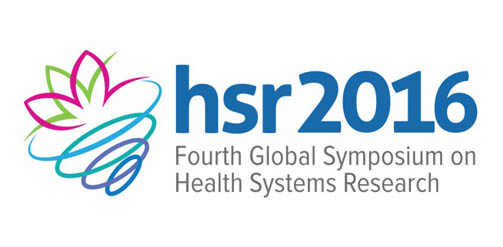The global community is facing challenges that will have seismic implications for the health of societies and individuals now and in the future. These challenges are broad and far-reaching, such as improving maternal and child health, addressing the burden of both infectious and non-communicable disease, reducing road traffic injuries, and achieving universal health coverage. To withstand and respond to these challenges we will need to put all our efforts on building resilient and responsive health systems.
This is the backdrop to the Fourth Global Symposium on Health Systems Research (HSR2016) in Vancouver, Canada, from 14-18 November, which will host over 2,000 policymakers, practitioners to explore these issues in depth.
The lead up to HSR2016 has seen many people around the world, through articles, meetings, and social media, highlight the need to learn from the likes of the terrible experience of the Ebola epidemic in West Africa to build more resilient health systems, and to place people and their current and changing needs at the centre of the design and delivery of future health systems.
The future of health systems
Health systems should be explicitly about protecting people, not only from major health shocks, such as infectious disease epidemics or the health impacts of natural disasters, but so that households, communities and societies are empowered to be resilient in challenging everyday lives.
The framing of the Sustainable Development Goals offers the opportunity for a more holistic and integrated approach to tackling health challenges alongside poverty, equity, and other interconnected problems. This points to different ways of thinking about health systems and reinforces the perspective of the likes of the Institute of Development Studies, that poverty and health are intertwined. Whilst good health is an important component of human wellbeing, ill health can lead to impoverishment, including because of the catastrophic financial burden of being unwell.
This reinforces a greater need for research that is not only rigorous and relevant to shape health systems policy and improve service delivery, but also interdisciplinary in nature to tackle poverty and improve health.
IDS at HSR2016
For IDS, HSR2016 is an exciting opportunity to interact with current and future partners to share learning and explore new opportunities. IDS will not only to be participating alongside many others at HSR2016, including as part of the Future Health Systems consortium and the Impact Initiative, but will also be part of the Health Systems Global (HSG) team that is supporting the Symposium in Vancouver, and the organising group that will be co-hosting the 2018 Symposium in Liverpool, UK.
At IDS, and with HSG and partners, we will help to shape, facilitate and carry out high quality research that will engage and inform the development of health systems for resilient societies. My hope for and after HSR2016 is that we see a much greater interaction between what can be infuriating intellectual silos. These challenges do not exist in isolation, so nor should we.
